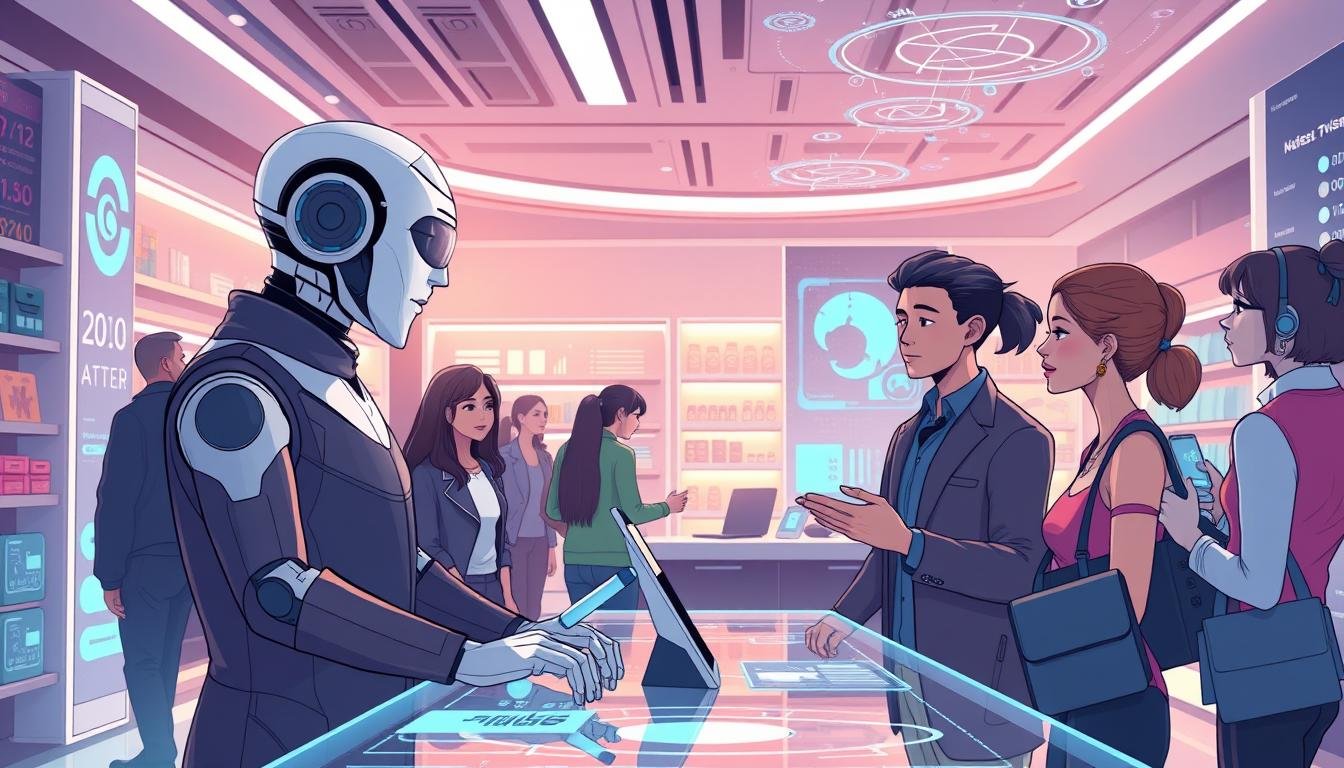The Role of AI in Enhancing Customer Experiences
Can artificial intelligence (AI) make customer service better and more emotionally engaging?
In today’s digital world, customer needs keep changing thanks to new tech. Deloitte’s study shows AI is key in making customer service better. But, keeping the human touch is still very important.
The old ways of customer service are fading away. Now, AI is leading the way with proactive solutions.
Big names like Home Depot and Starbucks are using AI to offer unique experiences. AI is changing customer service from just solving problems to preventing them. This is a big step forward.
Key Takeaways
- AI can solve problems before they happen, offering quick, real-time solutions.
- AI helps by automating simple tasks, cutting down on time and costs.
- Companies like Home Depot and Starbucks use AI to offer personalized services, standing out from the competition.
- It’s important to keep the human side, mixing AI’s efficiency with empathy.
- AI can enhance customer interactions while keeping the human connection, which is key for trust.
Introduction to AI in Customer Experience
Artificial Intelligence (AI) is changing how we interact with customers. It combines technology with human understanding for personalized and engaging experiences. Companies are investing in AI strategies to improve their customer interactions.
Defining Customer Experience and AI
Customer experience is the journey a customer has with a brand. It includes every interaction, from the first contact to after they buy something. AI plays a big role by making these interactions better with data-driven insights.
Big names like Amazon and Netflix show AI’s power. They use algorithms to suggest products or content based on what you like. This makes shopping and watching movies better. AI also helps businesses create marketing that really speaks to each customer, improving engagement and sales.
Tools like Apple’s Siri, Amazon’s Alexa, and Google Assistant make our lives easier. They can do tasks, give information, and even control smart home devices with just your voice. This automation makes things more convenient and saves money.
Why AI is Transforming Customer Service
AI is changing customer service from reactive to proactive. It uses predictive analytics to know what customers need before they ask. For example, airlines can warn you of flight delays and offer solutions, making travel smoother.
AI chatbots are changing customer service too. They answer common questions, process orders, and handle many customer inquiries. This makes responses faster and lets human agents focus on harder issues. G2 says 68% of customers like how fast and efficient AI chatbots are.
AI also gives deep insights into what customers like and need. This data helps businesses make better decisions. For instance, Starbucks uses predictive analytics to offer services that fit what customers want, making every visit special.
| AI Application | Benefit | Example |
|---|---|---|
| Predictive Analytics | Anticipates Customer Needs | Starbucks’ Customized Offers |
| AI-Powered Chatbots | Improves Response Times | Amazon’s Customer Support |
| Personalized Recommendations | Enhances Engagement | Netflix’s Content Suggestions |
| Virtual Assistants | Streamlines Tasks | Google Assistant |
Natural Language Processing and Conversational AI
Advances in natural language processing (NLP) and conversational AI are changing customer service. These technologies help companies talk to customers in new ways. They make interactions smooth and personal, improving the user experience.
How NLP Enhances Communication
NLP is key in understanding human language, making talks more natural and effective. Jared Stern, CEO of Uplift Legal Funding, says NLP in call centers cuts down on data work and boosts security. It uses different analyses to get what people mean and what they’re talking about, helping support teams a lot.
For example, Netomi’s AI agents solved 87% of chat tickets for WestJet during the COVID-19 travel restrictions. This greatly helped during busy times.
The Rise of Conversational AI
Conversational AI is becoming more popular in customer service. Tools like chatbots give quick answers and solutions. For example, NLP-powered IVR systems make customer experiences better by handling queries well and collecting data to help sales.
Raj Gupta, Chief Engineering Officer at Cogito, says conversational intelligence can understand what customers mean and how they feel. This leads to deeper talks. AI keeps getting better as it learns from more data, keeping service quality high.
Benefits of Chatbots in Customer Service
Chatbots in customer service offer many benefits, like better efficiency and happier customers. They quickly answer simple questions, letting human agents handle harder issues. This leads to fewer calls and faster answers.
AI keeps learning and getting better, ensuring top-notch customer service. Chatbots are now a key part of good customer support strategies.
Predictive Analytics in Customer Experience
Predictive analytics uses data and algorithms to guess what might happen next. It’s key for meeting customer needs before they ask. This makes customer interactions better and more satisfying.
Understanding Predictive Analytics
Predictive analytics gives businesses smart insights from AI. It helps predict what customers will want, plan better, and work more efficiently. The market is growing fast, showing its importance.
Applications of Predictive Analytics
Predictive analytics has many uses in customer service. Retailers use it to guess what customers will buy and keep an eye on trends. It helps improve marketing and customer service, and even predict the best prices.
It also spots customers who might leave early, so businesses can act fast. This keeps customers happy and loyal.
Enhancing Customer Interactions with Predictive Analytics
Businesses can offer personalized experiences in real-time with predictive analytics. Most customers want personalized services, but not all get them. Predictive analytics helps fix this by making customers happier and more loyal.
It also helps manage leads better by focusing on the most likely to buy. This speeds up sales. Predictive analytics helps businesses act on what they know, making customer service better.
The Role of AI in Enhancing Customer Experiences
Artificial intelligence (AI) is changing how companies talk to their customers. It makes interactions more efficient and personal. About 60% of people are more likely to buy again if they get a personalized shopping experience.
AI works closely with customer service tools to improve the customer journey. It quickly analyzes huge amounts of data, like the Medallia Experience Cloud does. This helps brands understand what customers want and deliver what they need, making customers happier and more loyal. Personalized product suggestions, often made by AI, make up 31% of online store sales.
AI also makes customer support faster and more efficient. For instance, 62% of people prefer talking to chatbots over waiting for a human. AI chatbots handle simple questions, so humans can focus on more important tasks.
Using AI to solve customer problems quickly can keep customers loyal. AI helps with tasks like writing emails and taking notes, so agents can talk to customers more. This makes service better and agents more ready to help. Also, 88% of service leaders invest in training agents, and AI helps with that.
AI has a big role in making customer experiences better. It helps brands understand and meet customer needs, making them happier and more loyal. This gives brands an edge in the market.
Customer Service Automation
Automation in customer service changes how businesses handle routine tasks. It makes interactions more efficient and consistent. Companies can now handle more requests and improve service quality, gaining customer trust.
Streamlining Routine Tasks
Service automation boosts the first contact resolution (FCR) rate. This means more issues are solved right away, reducing follow-ups. It also increases customer loyalty and satisfaction.
Automation cuts down on human errors, ensuring quality service. It helps businesses grow without needing more staff. Automated systems respond quickly, solving many simple queries in seconds.
Implementing Voice Assistants
Voice assistants add an interactive touch to customer service. They work like humans, offering 24/7 support. This meets customer needs for quick help anytime.
They make complex issues easier to handle, especially over the phone. Voice assistants also provide summaries and transcriptions, improving training and consistency. Companies like Virgin Pulse have seen big improvements.
The Benefits of Sentiment Analysis
Sentiment analysis in AI-driven customer service gives deep insights into customer feelings. It helps agents handle different situations better, improving service quality. It offers personalized, empathetic responses and spots customer pain points in real-time.
For example, Esusu uses AI to summarize tickets for agents. This boosts efficiency and enhances the customer experience.
Conclusion
AI is changing how we interact with customers, making technology and people work together smoothly. As AI keeps getting better, businesses see big wins in efficiency, personalization, and making customers happy. For example, a big e-commerce site saw a 20% jump in sales and a 15% drop in cart abandonments thanks to AI.
A top bank also saw a 30% boost in customer happiness and a 25% cut in call center costs with smart chatbots. Predictive analytics are also making a big difference. A healthcare company saw an 18% rise in patients showing up for appointments by using predictive tools to guess who might not show up.
These examples show how AI can help businesses meet customer needs better. But, using AI right is key. Companies must follow rules like GDPR and CCPA to keep customer data safe. Regular checks on AI systems also help avoid unfair treatment of customers.
It’s important to mix AI with human touch to keep customers feeling special. AI tools like chatbots and voice assistants are great, but they can’t replace the personal touch. As we move forward, being open about how we use data and training staff on AI will help build trust. The goal is to use AI to make customer interactions better, not just to use it.
Source Links
- How AI Is Revolutionizing Customer Experience
- How will AI impact the customer experience?
- Enhancing Customer Experience with AI: A Comprehensive Overview
- How AI is transforming customer experience for businesses
- IBM AI in Customer Experience (CX)
- How Natural Language Programming and Conversational AI Are Taking on the Call Center
- Revolutionizing Customer Experience: The Role of Natural Language Processing in Conversational AI.
- What is Conversational AI? | IBM
- How Predictive Analytics Can Improve Customer Experience – Previous CX Index
- Predictive Analytics Examples & Benefits on CX | InMoment
- How AI Can Transform Customer Experience: 8 Amazing Ways
- What You Need to Know – Medallia
- The Role of Automation in Enhancing Customer Experience
- AI in customer service: All you need to know
- What are the Benefits of AI in Customer Service Automation? | NICE
- The Role of AI in Enhancing Customer Experience
- The Role of AI in Enhancing Customer Experience
- The Role of AI in Enhancing Customer Experience







